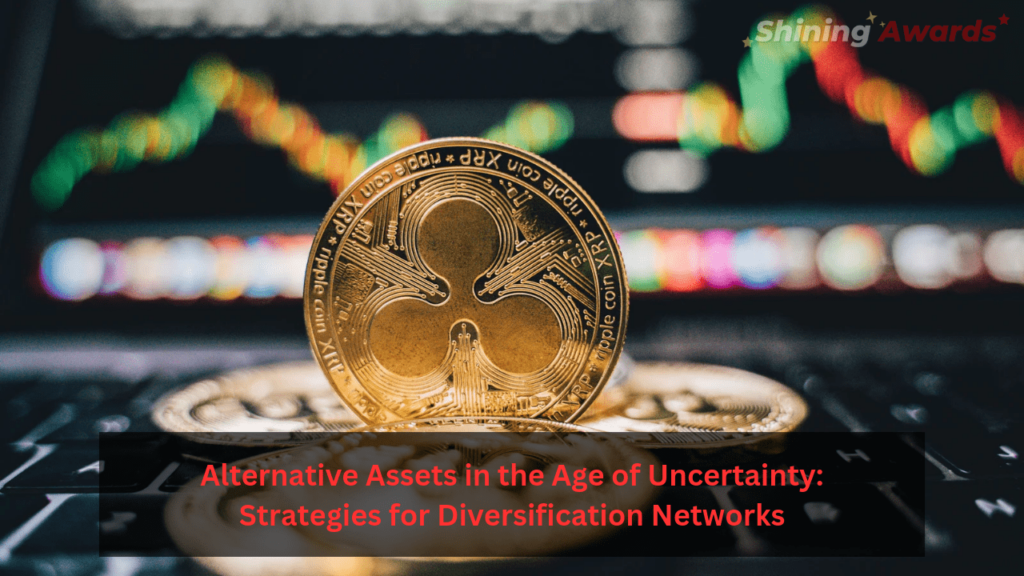Alternative Assets in the Age of Uncertainty: Strategies for Diversification
Strategies for Diversification – In an era marked by economic turbulence and global uncertainties, investors are seeking innovative ways to diversify their portfolios and safeguard their wealth. Traditional investments like stocks and bonds have proven to be vulnerable to market volatility, making alternative assets an attractive option for those looking to minimize risk and maximize returns. This article will delve into the realm of alternative assets and explore strategies for diversification in these uncertain times. It will also shed light on a promising online trading platform which opens doors to a new dimension of alternative investing. To efficiently invest in crypto like Bitcoin, you may consider knowing about Navigating the Bitcoin Realm.
Strategies for Diversification

The Appeal of Alternative Assets
The Landscape of Investments
Investing in the 21st century has transformed significantly. No longer are investors limited to the traditional stock and bond markets. A wide array of alternative assets, including real estate, commodities, private equity, and cryptocurrencies, has emerged as intriguing options. These assets offer an attractive proposition: they often move independently of the stock market and can provide a hedge against volatility.
Diversifying into Real Estate
Real Estate: Tangible and Time-Tested
Real estate is a time-tested alternative investment that continues to thrive in the face of uncertainty. Investing in physical properties, whether residential or commercial, provides investors with tangible assets that have intrinsic value. Moreover, rental income from real estate can be a consistent source of cash flow, even when stock markets are in turmoil.
Exploring Commodities
Commodities: A Natural Hedge
Commodities like gold, silver, and oil have been go-to assets for investors seeking refuge during economic instability. These tangible goods can act as a natural hedge against inflation and currency devaluation, offering a buffer against economic turmoil.
Venturing into Private Equity
Private Equity: High Risk, High Reward
Private equity investments involve funding startups, small businesses, or ventures not publicly traded. While inherently riskier than traditional investments, private equity can yield substantial returns. These investments are often less correlated with the stock market, adding an extra layer of diversification.
Unlocking New Horizons
Cryptocurrencies: The Digital Frontier
In the world of alternative assets, cryptocurrencies have made a significant impact. An online trading platform allows investors to access the dynamic cryptocurrency market. As cryptocurrencies like Bitcoin and Ethereum continue to gain popularity, they offer diversification potential that can’t be ignored.
Navigating the Cryptocurrency Market
The Rise of Digital Currencies
Cryptocurrencies have rapidly gained ground as a legitimate alternative asset class. Their decentralized nature, combined with blockchain technology, makes them appealing in a world where data privacy and security are paramount. The cryptocurrency market operates 24/7, providing investors with flexibility and opportunity at all hours.
Harnessing the Power of Blockchain
Blockchain: The Backbone of Cryptocurrencies
Behind every cryptocurrency is a blockchain, a transparent and secure ledger technology. The blockchain eliminates the need for intermediaries and enhances the security and efficiency of transactions. This technology has applications beyond cryptocurrencies, including supply chain management and voting systems.
Risk and Reward
Volatility and Potential Returns
Investing in cryptocurrencies comes with its fair share of risk. The market is highly volatile, with prices that can experience rapid fluctuations. However, for those willing to embrace this volatility, the potential returns can be substantial. Online platform provides a platform to harness this potential while managing risk through features like stop-loss orders.
Diversification Strategies
Balancing the Portfolio
Diversification is key to managing risk when investing in alternative assets. A well-balanced portfolio might include a mix of real estate, commodities, private equity, and cryptocurrencies. The idea is to spread risk across different asset classes, reducing exposure to a single market’s ups and downs.
Maintaining Liquidity
Liquidity and Access to Funds
Investors should also consider the liquidity of their investments. While real estate and private equity investments can tie up funds for extended periods, cryptocurrencies and commodities typically offer more immediate liquidity. This can be advantageous in times when quick access to funds is needed.
Risk Tolerance and Investment Horizon
Understanding Risk Tolerance
Investors must have a clear understanding of their risk tolerance and investment horizon. Different alternative assets come with varying levels of risk, and it’s essential to match these factors with individual preferences and financial goals. For those with a higher risk appetite, allocating a portion of the portfolio to cryptocurrencies through online platform might be a strategic move.
Staying Informed
Continuous Learning
In the world of alternative investments, knowledge is power. Staying informed about market trends, regulations, and technological advancements is crucial. As the cryptocurrency market continues to evolve, being aware of changes and innovations is essential for making informed decisions.
Conclusion
In an age defined by economic uncertainty, diversifying into alternative assets has become more than a strategy—it’s a necessity. Traditional investments no longer provide the comfort they once did, and investors must adapt to the changing landscape. By combining traditional assets with alternative ones, investors can position themselves to thrive amidst the uncertainty of the modern financial world.